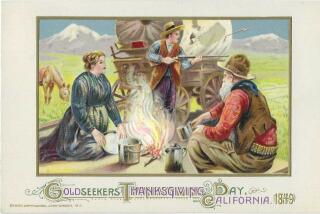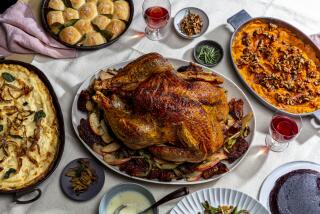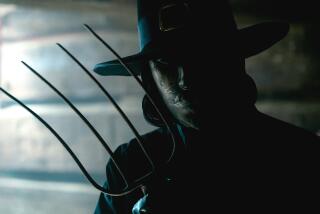Be Thankful for a Nation of Pluralism
- Share via
Pilgrim Gov. William Bradford of the Plymouth Colony surely did not intend a pluralistic feast when he proclaimed a three-day Thanksgiving celebration in October 1621. Nonetheless, that first Thanksgiving brought together the 50 (of 102) Mayflower Pilgrims who had survived their first year in America and 90 or so Wampanoag Indians.
The celebration built on a relationship with the Indians that had begun only in March. The Wampanoags enhanced the feast with their abundant food, including wild turkeys and pumpkins, but probably not with their faith.
Whatever Bradford’s intent, the first Thanksgiving was in fact a pluralistic celebration. The Wampanoags were of course not Christian. They were one of numerous tribes in the Plymouth Bay area belonging to the Algonquin language group that stretched from Canada to South Carolina and as far west as today’s Wisconsin.
“Wampanoag” means land of the first light, or land where the sun comes up first. They had their own culture, spirituality, ways of worship and ceremonial lands. They thanked God as they knew God and in their own way.
Although Bradford and the Pilgrims were grateful for the Wampanoags’ help, and ate turkey and squash with them, they were not so grateful for their religion and spirituality. Bradford’s colleague, Miles Standish, is remembered as a man with a musket in one hand and a Bible in the other. The Indians experienced both as weapons for dominating and controlling them.
The settlers had left England for religious freedom, but only for their own version of religion. They occupied the Native Americans’ land and sought to impose their beliefs on them. The Pilgrims were not pluralists, Thanksgiving meals together notwithstanding.
George Washington may have been thinking pluralistically when he proclaimed Nov. 26, 1789, the first national Thanksgiving Day. He headed a union of Congregational New Englanders, Quaker Pennsylvanians, Catholic Marylanders, Anglican Virginians, Masonic Deists like Thomas Jefferson and himself, and humanist thinkers like Benjamin Franklin. The celebration didn’t take hold, so its observance across the nation was spotty until Abraham Lincoln, at the urging of Sarah Josepha Hale, revived the custom and fixed the fourth Thursday of November as the annual date. Congress confirmed that timing in 1941.
Today, many Americans still hesitate to thank God for our religious plurality and avoid celebrating it together. The Supreme Court and other judicial bodies are resented for decisions that challenge the presumption that “America is a Christian nation.” We have the freedom to worship God according to our conscience and tradition but, like Miles Standish, too many of us worry about the way others exercise that same freedom. “God bless America” means our God, our America.
Nonetheless, Thanksgiving this year will bring together many people of various faith traditions. In my experience this has meant mainly gatherings of Christians -- different denominations but still Christians. But in some places it is Christians, Muslims, Jews and others.
We need to grow more comfortable with the world’s religious plurality and our nation’s. Whatever our own faith tradition, we need to recognize that pluralism is part of the Creator’s gift to us. Then we will give thanks for that heritage with as much gusto as we give thanks for our turkey and pumpkin pie.
More to Read
Sign up for The Wild
We’ll help you find the best places to hike, bike and run, as well as the perfect silent spots for meditation and yoga.
You may occasionally receive promotional content from the Los Angeles Times.






